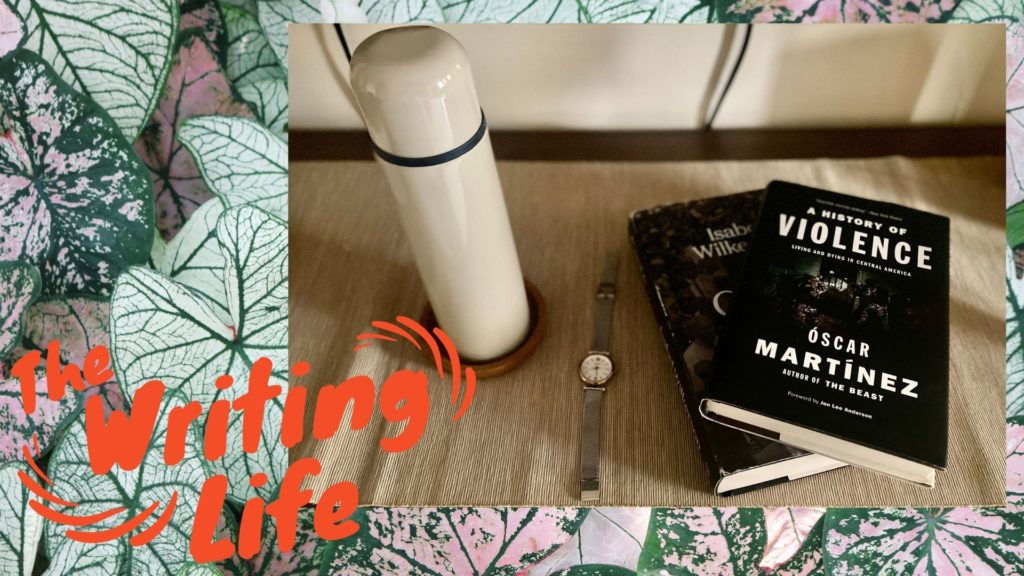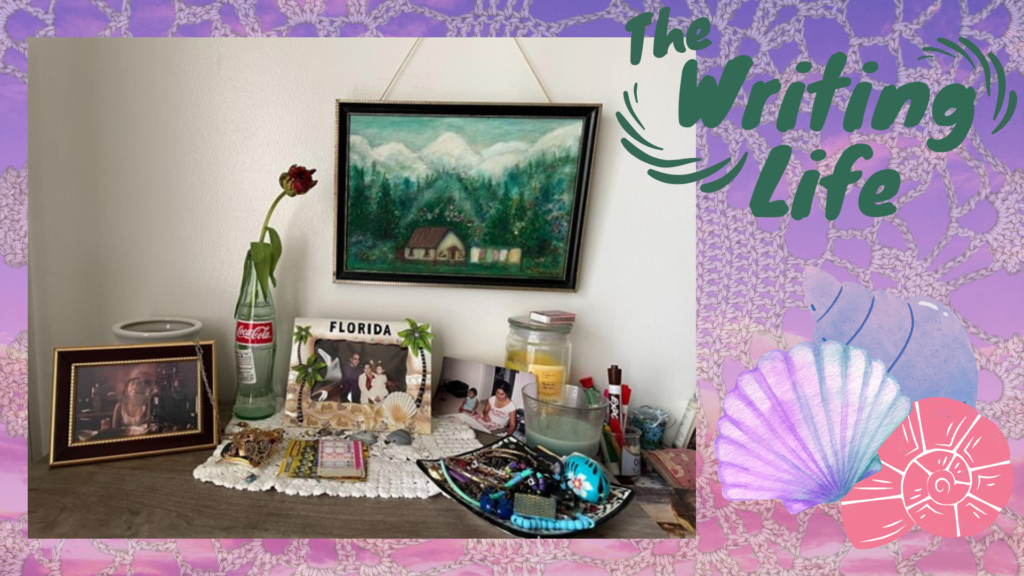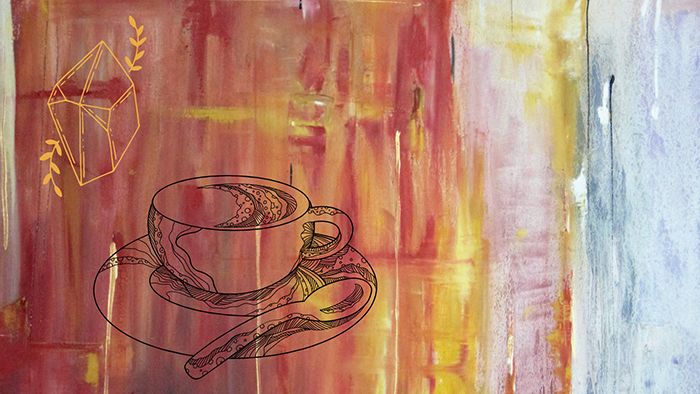Former Open City Fellow Mohamad Saleh answers ten questions about his writing life
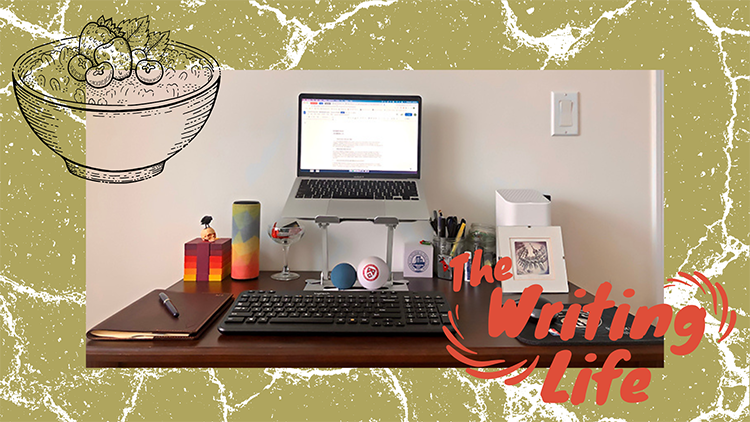
October 6, 2022
“Writing is easy,” Pulitzer Prize–winning sportswriter Red Smith once said. “All you do is sit down at a typewriter and open your veins, and bleed.” Putting pen to paper (or fingers to a keyboard) is never a simple task, even for seasoned writers. Even our Margins and Open City Fellows—and there’s quite a handful of them—can attest to that. Many of them, though, have gone on to write and report for mainstream publications and publish books. In this series, we reached out to our former fellows and asked them to give us a glimpse of their writing lives and to share some tips on how they navigate this creative process called writing.
Mohamad Saleh was an Open City Fellow in 2019. In “Left on 86th,” he explores the nooks and crannies of Bay Ridge and wonders what makes his neighborhood a place where white supremacists and Arabs, and other religious, linguistic and ethnic groups could live together side-by-side. He poses two questions in his next story, “Rites of Return“: What does it mean for a Palestinian living in the United States to resist? And the one at the heart of international Palestinian activism: Will we (Palestinians in the Diaspora) return in our lifetime?
Mohamad also interviewed Ramy Youssef, the lead actor and co-creator of the Hulu series Ramy, about the Arab-Muslim American experience in “It’s Now in Our Hands.” Most recently, he penned a short story about a young Palestinian woman who was hired by a museum to be a live human mannequin portraying Leila Khaled in “The Last Palestinian.”
Here’s Mohamad.
—Noel Pangilinan
1. How do you start your day?
I try to do something repetitive that doesn’t need much brain power. I think that constitutes meditation. Activities include but are not limited to: physical exercise, walking in a circle, watching football highlights, counting the number of times my cat hits himself in the face with his tail, making oatmeal, and boiling broccoli.
2. What book made you cry?
Returning to Haifa by Ghassan Kanafani, one of the most impactful novellas ever written. It centers a Palestinian couple returning to their home in Haifa, from which they were expelled in 1948. The historical significance of the story, character development, and plot were so engrossing I didn’t even realize when I started crying. I remember stopping, though. There was snot.
3. How and where do you get ideas for your stories?
A fantastic albeit potentially dangerous way of finding stories is eavesdropping on strangers having very intense conversations. Once at a party organized in an American Legion abutting a swamp, I overheard two people loud whisper the following exchange:
“Sometimes when he’s out, I think about what I would do if he died. Not murder. Like, car crash, or he falls into one of those basement entrances outside delis. Stroke maybe.”
“I imagine she finds out she’s infertile and we can’t have kids, and I use that as the reason for ending the relationship. We shouldn’t be saying this stuff.”
“It’s ok. We just met. And we won’t remember each other at all.”
Walking around a city is also great for story-picking. First, find a large group of people. Any group of people: tourists, businesspeople, construction workers, firefighters, MTA workers, lawyers, skateboarders, dog walkers with a panoply of dogs, models, line cooks on their smoke break, resident chess players in public parks, more tourists, bouncers, people waiting on the lines leading up to the bouncers, and so on. Then, watch them. For as long as you can or are allowed to. The ideas will start flowing.
And of course, art. Art is probably the most fertile source of ideas and inspiration. Any kind of art. Paintings, movies, series, novels, poems, music. Small example: like most people, music helps me visualize scenes. I rely on this habit a lot to write scripts and essays.
4. Do you have any tips for interviewing people?
Read everything you can about them before speaking with them. You don’t want to waste any precious interviewing time asking a question that’s already been answered and is part of the general record. Also, once you’ve come to understand the narrative that defines a person to the public, you can start to more effectively pose questions that expand that narrative.
5. How do you deal with writer’s block?
Lots of art. Visual, sonic, or literary. I go to museums, I watch movies and series, I listen to and play music. Whenever I feel blocked, it’s almost always because of not doing the prep necessary to write. Kind of like an athlete expecting to perform well in a competition without having exercised beforehand.
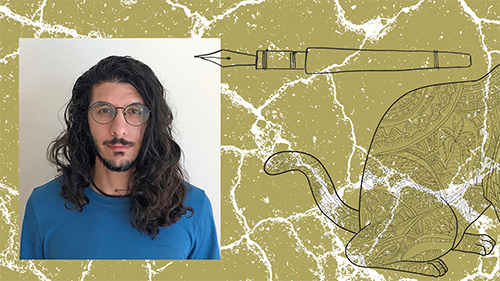
6. What is your writing Kryptonite?
A headache. I don’t know if it’s possible to string words together in a coherent, let alone interesting or entertaining way while enduring a headache. The machine you need to use to write is on the fritz. It needs an oil change and a new battery. ASAP.
7. What’s your fondest memory of being an AAWW Fellow?
During the last few weeks of the fellowship, my cohort organized a culinary trek through Bay Ridge, Brooklyn, the neighborhood in which I grew up. I specifically remember taking them to a little sweet shop across the street from the mosque I attended as a child and adolescent. The knafeh we had was absolutely delicious, made even sweeter by the presence of my friends and colleagues. I often return to our jaunt around the neighborhood and the sudden realization that the houses and buildings lacked anything approximating architectural consistency—some homes looked like they were built during the nineteenth century, others looked slick and futuristic, and still others looked out of place with their surroundings.
8. If you didn’t write, what would you do for work?
Probably teaching. In college I tutored pre-med students in physics, then in grad school I was the teaching assistant in an Arabic class. I thoroughly enjoyed both experiences, and would gladly return to teaching in the future.
9. What did you do with your first stipend or advance?
Growing up I always imagined that if I ever became a writer—which at the time meant that someone paid me real actual currency, preferably American dollars, to write—I would buy a nice fountain pen. To write with, sure, but also just to have. Like a personal trophy. So that’s what I bought. A navy Parker fountain pen.
10. What’s the best or worst piece of writing advice you’ve received?
“Every piece of writing should have an introduction, a body, and a conclusion.” Awful advice. Every piece of writing should express or represent. How it does so is solely at the writer’s discretion.
Other stories in The Writing Life series:
“When You’re Interviewing, You’re the One in Charge” by Eveline Chao
“Just Listen, Really Listen” By Roja Heydarpour
“No Other Way to Be a Writer Except to Be Alone in a Room” by Anelise Chen
That Which You Are Afraid to Write, Write It” by huiying b. chan
“Cut Down the Quotes . . . Include Only Gemlike Phrases” by E. Tammy Kim
“I Am Still Developing as a Writer” by Hannah Bae
“Write a Sentence—Any Sentence—No Matter How Bad It Is” by Astha Rajvanshi
“Intuition Is My Main Tool” by Chaya Babu
“Writer’s Block? What’s That?” by Humera Afridi

